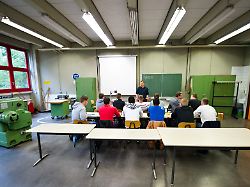From school to work
A lack of internships causes initial difficulties
9/7/2023 8:33 am
listen to the article
This audio version was artificially generated. More Info | send feedback
What do I want to be when I grow up and how do I get my training and career off to a good start? In the pandemic, many young people have grown insecure and worried about the future. There are many offers of help.
At the beginning of the new training year, many young people in Germany are struggling with initial difficulties in training and professional life. A lack of counseling offers and internships made career orientation more difficult during the corona pandemic. This has a lasting effect and means that many young people find it difficult to make a choice and they postpone decisions, as Bernd Fitzenberger, Director of the Institute for Labor Market and Occupational Research (IAB), reports. The consequences can also be seen on the training market, where according to the latest data from the Federal Employment Agency (BA), 177,000 places were still vacant.
From the point of view of the IAB director, there is a particular problem at the interface between schools and companies: Despite severe staff shortages, it is still not easy to find an internship in the desired job. Although training fairs and similar offers can take place again as they did before the pandemic, companies still find it difficult to get in touch with schoolchildren. “Schools and companies should approach each other even more here, supported by the Federal Employment Agency and local actors,” said Fitzenberger.
skill level dropped
Career orientation should also be firmly anchored in the curricula of all types of school. School performance levels have deteriorated somewhat during the pandemic, but given the shortage of skilled workers, more underperforming young people are now being given opportunities by companies than in the past.
If necessary, the BA offers support through assisted training or introductory training – these are subsidized long-term internships that are subject to social security contributions, through which employers and potential trainees can get to know each other better and the young people can also catch up on performance arrears. The vocational schools should also be well integrated here, explained Fitzenberger. “However, too little is known about these measures and they are not used enough.”
Similar experiences have been made with the “Vera” initiative funded by the Federal Ministry of Education. She wants to make young people fit for working life and prevent the risk of dropping out of training. The pandemic has increased the uncertainty among many young people, says Vera manager Astrid Kloos. A relatively large number of them need assistance, but the possibilities are too little known and also too confusing.
Hardly any training places known
“Many don’t even know what jobs there are.” That’s why they then opted for one of the classic training courses such as automotive mechatronics technician or salesman – although that might not correspond to their inclinations or strengths. A lot has happened in terms of training, “the young people have to know that,” said Kloos.
Since the end of 2008, the initiative has brought retired professionals together with trainees who need support. With 1:1 coaching, the experts accompany you on your way into professional life – whether you have difficulties at vocational school, stress in the training company or other problems.
More than 21,000 young people have been supported during this time – with a success rate of 75 percent, says Kloos. The quota is based on the achievement of individual goals that each tandem of coach and trainee sets together – whether it’s about completing the training or improving grades at the vocational school. Anyone looking for support can register via the Vera website – the offer is low-threshold and free.
Initiative needed on the part of the companies
In addition to such help for trainees, companies and vocational schools should also consider how they can make it easier for young people to get started – from lower hurdles for young people who cannot produce 1-level qualifications, to fair payment and the design of examinations, said Kloos. “Examination tasks, for example, are often written in such a way that no one understands them” – and this is the case with a high proportion of trainees with foreign roots.
In the meantime, companies are also increasingly gearing themselves to young people with initial difficulties, as the general manager of the German Chamber of Industry and Commerce, Achim Dercks, says. “Our current DIHK training survey shows: 80 percent of the training companies have offers to support young people with deficits and to bring them into training. 35 percent even have their own tutoring offer.” Three out of four training companies also wanted to further expand their offers in professional orientation. So there should be more student internships in the future – according to the survey, 61 percent of the companies are planning this.
Overall, Dercks is confident about this training year – even if the situation on the training market is still tense. This is where demographic change in particular has an impact, with around 100,000 fewer school leavers than ten years ago. “It is all the more gratifying that the number of training contracts in the IHK area has recently developed positively,” explained Dercks. “Overall, there are good prospects that in 2023 more companies and trainees will find each other through a training contract than in the previous year.”
